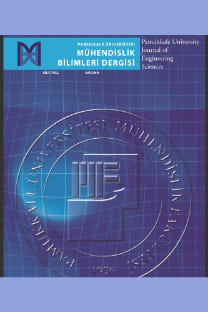Kemoterapi randevularının hemşireler arasındaki iş yükü dengesi gözetilerek belirsizlik altında çizelgelenmesi
Kemoterapi çizelgeleme, Stokastik programlama, Sağlık hizmeti operasyonları
Chemotherapy appointment scheduling under uncertainty by considering workload balance among nurses
___
- [1] Wilson BE, Jacob S, Yap ML, Ferlay J, Bray F. “Estimates of global chemotherapy demands and corresponding physician workforce requirements for 2018 and 2040: a population-based study”. The Lancet Oncology, 20(6), 769-780, 2019.
- [2] Castaing J, Cohn A, Denton BT, Weizer A. “A stochastic programming approach to reduce patient wait times and overtime in an outpatient infusion center”. IIE Transactions on Healthcare Systems Engineering, 6(3), 111-125, 2016.
- [3] Lame G, Jouini O, Cardinal JSL. “Outpatient chemotherapy planning: A literature review with insights from a case study”. IIE Transactions on Healthcare Systems Engineering, 6(3), 127-139, 2016.
- [4] Gupta D, Denton B. “Appointment scheduling in health care: Challenges and opportunities”. IIE Transactions, 40(9), 800-819, 2008.
- [5] Cayirli T, Veral E. “Outpatient scheduling in health care: a review of literature”. Production and Operations Management, 12(4), 519-549, 2003.
- [6] Ahmadi-Javid A, Jalali Z, Klassen KJ. “Outpatient appointment systems in healthcare: a review of optimization studies”. European Journal of Operational Research, 258(1), 3-34, 2017.
- [7] Turkcan A, Zeng B, Lawley M. “Chemotherapy operations planning and scheduling”. IIE Transactions on Healthcare Systems Engineering, 2(1), 31-49, 2012.
- [8] Heshmat M, Nakata K, Eltawil A. “Solving the patient appointment scheduling problem in outpatient chemotherapy clinics using clustering and mathematical programming”. Computers & Industrial Engineering, 124, 347-358, 2018.
- [9] Sevinc S, Sanli UA, Goker E. “Algorithms for scheduling of chemotherapy plans”. Computers in Biology and Medicine, 43(12), 2103-2109, 2013.
- [10] Hesaraki AF, Dellaert NP, de Kok T. “Generating outpatient chemotherapy appointment templates with balanced flowtime and makespan”. European Journal of Operational Research, 275(1), 304-318, 2019.
- [11] Liang B, Turkcan A. “Acuity-based nurse assignment and patient scheduling in oncology clinics”. Health Care Management Science, 19(3), 207-226, 2016.
- [12] Santibanez P, Aristizabal R, Puterman ML, Chow VS, Huang W, Kollmannsberger C, Nordin T, Runzer N, Tyldesley S. “Operations research methods improve chemotherapy patient appointment scheduling”. The Joint Commission Journal on Quality and Patient Safety, 38(12), 541-553, 2012.
- [13] Hahn-Goldberg S, Beck JC, Carter MW, Trudeau M, Sousa P, Beattie K. “Solving the chemotherapy outpatient scheduling problem with constraint programming”. Journal of Applied Operational Research, 6(3), 135-144, 2014.
- [14] Huggins A, Claudio D, Perez E. “Improving resource utilization in a cancer clinic: an optimization model”. IIE Annual Conference and Expo 2014, Montreal, Canada, 31 May-3 June 2014.
- [15] Alvarado M, Ntaimo L. “Chemotherapy appointment scheduling under uncertainty using mean-risk stochastic integer programming”. Health Care Management Science, 21(1), 87-104, 2018.
- [16] Mandelbaum A, Momcilovic P, Trichakis N, Kadish S, Leib R, Bunnell CA. “Data-driven appointment scheduling under uncertainty: The case of an infusion unit in a cancer center”. Management Science, 66(1), 1-28, 2019.
- [17] Demir NB, Gul S, Çelik M. “A stochastic programming approach for chemotherapy appointment scheduling”. Naval Research Logistics, 68(1), 112-133, 2021.
- ISSN: 1300-7009
- Başlangıç: 1995
- Yayıncı: PAMUKKALE ÜNİVERSİTESİ
Borsa endeks hareket yönünün çoklu lojistik regresyon ve k-en yakın komşu algoritması ile tahmini
Gülder KEMALBAY, Begüm Nur ALKIŞ
Rastgele ormanlardan kural çıkarmada küme bölüntüleme formülasyonlarının performans analizi
Titreşen diskten girdap halkası kopmalarının deneysel incelenmesi
Global ölçekte faaliyet gösteren havalimanlarının göreceli sürdürülebilirlik analizi
Muhammet Enis BULAK, Funda Hatice ZENGİN, Fatma Serra ÇİFTÇİ
Atama kısıtlı tip-1 montaj hattı dengeleme problemi: Bir kısıt programlama modeli yaklaşımı
Mehmet PINARBAŞI, Hacı Mehmet ALAKAŞ
Mustafa UÇURUM, Emrah GÜNEŞSU, Tolga Berkay ŞİRİN, Yusuf KAYNAK
Mobilya işletmelerinde ergonomik yeterliliğin temel bileşen analizi (TBA) ile belirlenmesi
Velittin KALINKARA, Kadir ÖZKAYA, Taner DİZEL
Elyaf takviye biçiminin polipropilen kompozitlerin kayma özelliklerine etkisinin araştırılması
